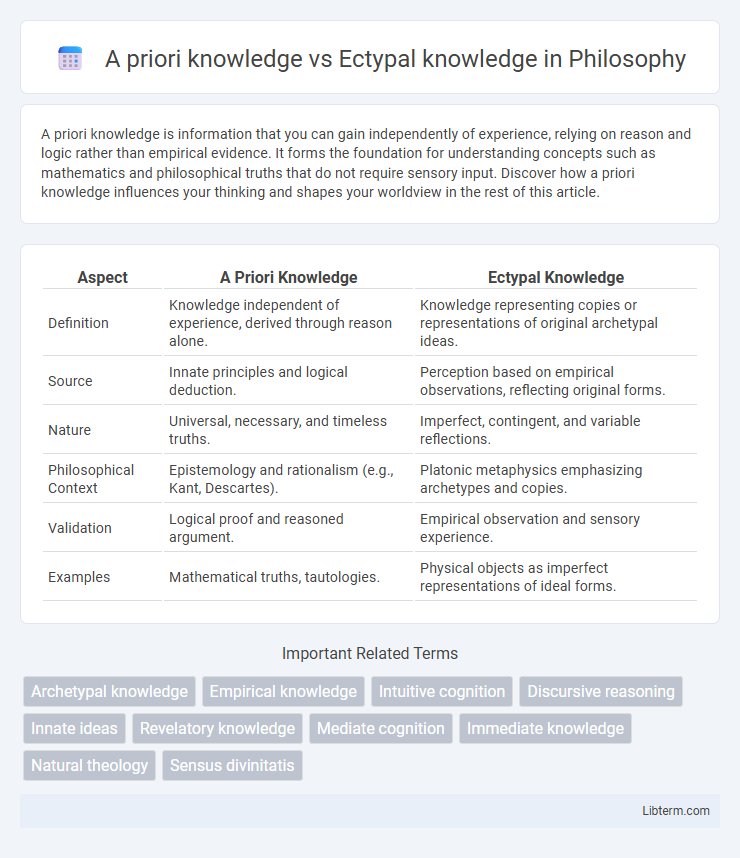A priori knowledge is information that you can gain independently of experience, relying on reason and logic rather than empirical evidence. It forms the foundation for understanding concepts such as mathematics and philosophical truths that do not require sensory input. Discover how a priori knowledge influences your thinking and shapes your worldview in the rest of this article.
Table of Comparison
| Aspect | A Priori Knowledge | Ectypal Knowledge |
|---|---|---|
| Definition | Knowledge independent of experience, derived through reason alone. | Knowledge representing copies or representations of original archetypal ideas. |
| Source | Innate principles and logical deduction. | Perception based on empirical observations, reflecting original forms. |
| Nature | Universal, necessary, and timeless truths. | Imperfect, contingent, and variable reflections. |
| Philosophical Context | Epistemology and rationalism (e.g., Kant, Descartes). | Platonic metaphysics emphasizing archetypes and copies. |
| Validation | Logical proof and reasoned argument. | Empirical observation and sensory experience. |
| Examples | Mathematical truths, tautologies. | Physical objects as imperfect representations of ideal forms. |
Understanding A Priori Knowledge
A priori knowledge refers to information or understanding obtained independently of sensory experience, relying solely on reason and logical deduction. It contrasts with ectypal knowledge, which is derived from empirical observation and external phenomena. Understanding a priori knowledge is crucial for grasping foundational concepts in philosophy, mathematics, and logic that do not depend on experiential evidence.
Defining Ectypal Knowledge
Ectypal knowledge refers to representations or understanding derived from imperfect or indirect copies of a perfect original, contrasting with a priori knowledge, which is independent of experience. It encompasses empirical insights and sensible perceptions that are contingent upon external realities and prior learning. This concept highlights how knowledge can be shaped by imperfect reflections or models of ideal forms rather than innate or purely rational cognition.
Historical Evolution of Both Concepts
A priori knowledge, rooted in rationalist philosophy since Descartes, emphasizes innate ideas and universal truths independent of experience, shaping epistemological debates through Kant's Critique of Pure Reason. Ectypal knowledge, emerging from theological contexts, particularly in Christian thought, refers to representations or images derived from a divine archetype, highlighting the distinction between direct, perfect knowledge and its imperfect copies. Historical evolution reveals a shift from metaphysical foundations to more nuanced understandings in modern philosophy and theology, intertwining epistemology with cognitive science and phenomenology.
Philosophical Foundations: Rationalism vs Empiricism
A priori knowledge is grounded in rationalism, asserting that certain truths are known independently of experience through reason and logical deduction, exemplified by mathematical and conceptual understanding. Ectypal knowledge aligns with empiricism, emphasizing knowledge derived from sensory experience and observation, highlighting the role of empirical evidence in forming beliefs about the external world. The philosophical foundations contrast innate knowledge and experiential learning, shaping ongoing debates on the sources and validation of human understanding.
Key Differences Between A Priori and Ectypal Knowledge
A priori knowledge is independent of experience and relies solely on reason and logical deduction, exemplified by mathematical truths and tautologies. Ectypal knowledge, by contrast, depends on sensory experience and empirical evidence, reflecting the contingent and imperfect representations of reality. The key difference lies in the source and necessity of the knowledge: a priori knowledge is necessary and universal, while ectypal knowledge is contingent and subject to verification or falsification through observation.
The Role of Intuition in Knowledge Acquisition
A priori knowledge relies on intuition as an immediate, non-empirical understanding that forms the foundation for logical reasoning and analytic truths. Ectypal knowledge, contrasted with archetypal knowledge, depends on sensory experience and external validation, where intuition guides hypothesis formation and empirical verification. The role of intuition in knowledge acquisition is crucial for bridging innate concepts with experiential learning, facilitating the synthesis of abstract reasoning and practical evidence.
Examples Illustrating A Priori Knowledge
A priori knowledge includes mathematical truths such as 2+2=4 and logical principles like the law of non-contradiction, which are known independently of sensory experience. Geometric facts, for example, the sum of interior angles in a triangle equals 180 degrees, also illustrate a priori knowledge. These examples contrast with ectypal knowledge, which derives from empirical evidence and observation.
Real-World Applications of Ectypal Knowledge
Ectypal knowledge, derived from sensory experience and empirical observation, plays a crucial role in scientific research, technological innovation, and practical decision-making across industries. It enables professionals to develop data-driven solutions, improve machine learning models, and enhance adaptive systems by continuously integrating new information from the environment. This type of knowledge supports real-world problem-solving by grounding theories and applications in concrete evidence, thereby facilitating advancement in fields such as engineering, healthcare, and environmental management.
Critiques and Debates in Epistemology
Critiques of a priori knowledge center on its alleged independence from experience, with skeptics arguing that purported a priori truths may implicitly rely on empirical intuitions or linguistic conventions. Debates regarding ectypal knowledge focus on its status as a representation derivative of divine archetypes, raising questions about the extent to which human cognition can access objective reality or merely imperfect copies thereof. These discussions highlight ongoing epistemological tensions concerning the source, certainty, and limits of human understanding in relation to abstract and empirical knowledge.
Implications for Modern Philosophy
A priori knowledge, characterized by its independence from empirical experience, underpins foundational principles in modern philosophy by emphasizing innate concepts and rational deduction. Ectypal knowledge, as a derivative and imperfect reflection of divine ideas, influences contemporary debates on the limitations of human understanding and the nature of truth. These distinctions shape ongoing discussions in epistemology, metaphysics, and the philosophy of mind regarding the source and certainty of knowledge.
A priori knowledge Infographic

 libterm.com
libterm.com